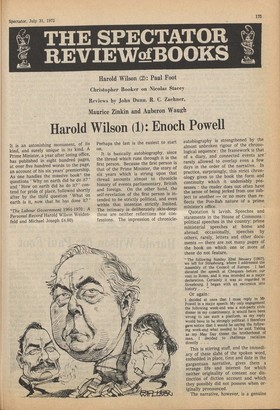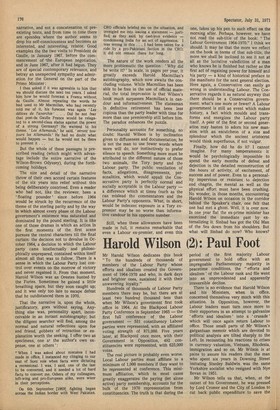Harold Wilson (1) : Enoch Powell
It is an astonishing monument, of its kind, and surely unique in its kind. A Prime Minister, a year after losing office, has published in eight hundred pages, at over five hundred words to the page, an account of his six years' premiership. As one handles the massive book'. the questions 'Why on earth did he do it? ' and How on earth did he do it?' contend for pride of place, followed shortly after by the third question What on earth is it, now that he has done it? '
The Labour Government 1964-1970: A Persona/ Record Harold Wilson Weidenfeld and Michael Joseph £4.80) Perhaps the last is the easiest to start on.
It is basically autobiography, since the thread which runs through it is the first person. Because the first person is that of the Prime Minister, the story of six years which is strung upon that thread amounts almost to chronicle history of events parliamentary, British and foreign. On the other hand, the self-revelation of the first person is intended to be strictly political, and even within that intention strictly limited. The intimacy is deliberately skin-deep: these are neither reflections nor confessions. The impression of chronicle autobiography is strengthened by the almost unbroken rigour of the chronological sequence : the framework is that of a diary, and connected events are rarely allowed to overlap even a few days in the order of the narrative. In practice, surprisingly, this strict chronology gives to the book the form and continuity which it undeniably possesses : the reader does not often have the sense of being jerked from one subject to another — or no more than reflects the Poo-Bah nature of a prime minister's office.
Quotation is lavish. Speeches and statements in the House of Commons : political speeches in the country; prime ministerial speeches at home and abroad; occasionally, speeches by others; rarely, letters and other documents — there are not many pages of the book on which one or more of these do not feature.
"The following Sunday 22nd January [1967], we left for Strasbourg, where I addressed the Assembly of the Council of Europe. I had dictated the speech at Chequers before our visit to Rome, and it was intended as a major declaration. Certainly it was so regarded in Strasbourg. I began with an excursion into history .
Or again : I decided at once that I must reply to Mr Powell in a major speech. My only engagement the following week-end was a non-party, civic dinner in my constituency. It would have been wrong to use such a platform, as my reply would have to be strongly political. I therefore gave notice that I would be saying the following week-end what needed to be said. Taking as my May Day theme the brotherhood of man, I decided to challenge racialism directly . . .
This is stirring stuff, and the immediacy of these slabs of the spoken word, embedded in place, time and date in the gargantuan narrative, gives them a strange life and interest for which neither originality of content nor distinction of diction account and which they possibly did not possess when originally pronounced.
The narrative, however, is a genuine narrative, and not a concatenation of preexisting texts, and from time to time there are episodes where the author seems to drop his self-consciousness and becomes an interested, and interesting, relator. Good examples the the two visits to President de Gaulle, in January 1967, before the commencement of -the European negotiation, and in June 1967, after it had begun. They are of special contemporary relevance, and betray an unexpected sympathy and admiration for the General on the part of the Prime Minister : I then asked if it was agreeable to him that we should discuss the next ten years. I asked him how he would forecast a France without de Gaulle. Almost repeating the words he had used to Mr Macmillan, who had recently told me of it, his forecast was again 'Les delices de Panarchie ' • . . Did he not fear that post-de Gaulle France would be relegated to a second-class status against the power of a strong Germany? He warmed to his theme. 'Les Allentands,' he said, ' seront toujours les A llemands.' He had no doubt what would happen — but he would not be there to prevent it . .
But the whole of these passages is prescribed reading (which might with advantage include the entire narrative of the Wilson-Brown Odyssey), during the forthcoming holidays.
The size and detail of the narrative throw of their own accord certain features of the six years into relief without this being deliberately contrived. Even a reader who had not, like the reviewer, been a ' floating pounder' since before 1964 would be struck by the recurrence of the theme of the sterling parity and by the way in which almost every phase of the Labour government's existence was saturated and dominated by the pound sterling. It is like one of those dramas in which an action in the first moments of the first scene pursues the central characters till the final curtain: the decision not to devalue in October 1964, a decision to which the Labour party came intellectually and philosophically unprepared, contained within itself almost all that was to follow. There is a sense in which the Labour Party lost control over events on the morrow of victory and never regained it. From that moment, Harold Wilson was an Orestes hunted by the Furies. Sometimes he gained a little breathing space, but they soon caught up; and it was only too late to escape defeat that he outdistanced them in 1970.
That the narrative is, upon the whole, justificatory, goes without saying. Anything else was, personality apart, inconceivable in an instant autobiography; but the diligent searcher will find, among the normal and natural reflections upon foe and friend, gobbets of retraction or explanation worth the seeking. I offer two as specimens, one at the author's own expense, one at others ' : "When I was asked about mistakes I had made in office, I instanced my clinging to our east of Suez role when facts were dictating a recessional. I was, I said, one of the last to be converted, and it needed a lot of hard facts to convert me. Others of my colleagues, left-wing and pro-European alike, were wiser in their perceptions.
On 6th September [19659 fighting began across the Indian border with West Pakistan. CRO officials briefed me on the situation, and inveigled me into issuing a statement — justified, as they said, by cast-iron evidence — condemning India for an act of aggression. I was wrong in this . . . I had been taken for a ride by a pro-Pakistani faction in the CRO; it did not remain there for long.
The nature of the work renders all the more problematic the question : 'Why did he write it?' In scale, in pages per year, it greatly exceeds Harold Macmillan's autobiography, which now awaits the concluding volume. While Macmillan has been able to be free in the use of official material, the total impression is that Wilson's book much surpasses Macmillan's in candour and informativeness. The statesman in definitive retirement has been less copious than the party leader with time for more than one premiership still before him. The paradox enhances the puzzle.
Personality accounts for something, no doubt: Harold Wilson is by inclination given to diffuseness and documentation; he is not the man to use fewer words where more will do, nor instinctively to prefer silence to speech. Something more must be attributed to the different nature of those two animals, the Tory party and the Labour party. The public ventilation of facts, allegations, disagreements, personalities, which would appall the Conservative party is perfectly normal and socially acceptable in the Labour party — a difference which at times (such as the can mislead the commentators and the Labour Party's opponents. What, in short, would be indecent exposure in a Tory expremier may be no worse than informative candour in his opposite number.
Still, when these allowances have been made in full, it remains remarkable that even a Labour ex-premier, and even this one, takes up his pen to such effect on the morning after. Perhaps, however, we have not read the sub-title of the book: "The Labour Government 1964-1970." I think we should. It may be that the more we reflect on the book in terms of that sub-title, the more we shall be inclined to see it not at all as the lucrative valediction of a man who knows he is finished but rather as the first act of regaining power for himself and his party — a kind of historical preface to the manifesto for the next general election. Here again, a Conservative can easily go wrong in understanding Labour. The Conservative regards it as natural anyway that there should be a Conservative government: what's one mote or fewer? A Labour government is still an event which makes history, a fact which moulds and transforms and energizes the Labour party itself. A peer of the first or second generation may hasten to adorn his new mansion with an escutcheon of a size and splendour which the ancient aristocrat would think superfluous, if not vulgar.
Finally, how did he do it? I cannot imagine. For many temperaments it would be psychologically impossible to spend the early months of defeat and dejection in the detailed reconstruction of the hours of activity, of excitement, of success and of power. Even to a personality impervious or resistant to dejection and chagrin, the mental as well as the physical effort must have been crushing. No wonder, in those months, encountering Harold Wilson on occasion in the corridor behind the Speaker's chair, one felt that one had met a ghost. Well, it is over now. In one year flat the ex-prime minister has exorcized the immediate past by externalizing it. Sinbad has got the Old Man of the Sea down from his shoulders. But what will Sinbad do now? Who knows?











































 Previous page
Previous page